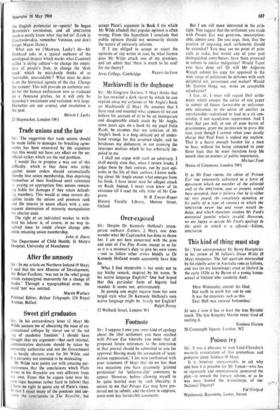Sweet girl graduates
Sir: In his extraordinary letter (2 May) Mr Wilde accuses me of obscuring the issue of co- educational colleges by 'clever use of the red rag of academic freedom.' I. should have thought that my argument—that such internal, administrative decisions should be taken by university -authorities and not the Government —is hardly obscure, even for Mr Wilde, and it is certainly not• intended to be misleading.
Mr Wilde next points out with amazing per- ceptiveness that the conclusions which Platt) draws in his Republic are very different from my own. From this he argues (and here his own logic becomes rather hard to follow) that have no right to quote any of Plato's views. In fact I reject many of the premises and cer- tainly the conclusions in The Republic, but accept Plato's argument in Book 6 (to which Mr Wilde alluded) that popular opinion is often wrong. From this hypothesis I conclude that public opinion should not necessarily dictate the nature of university reforms.
If I am obliged to accept or reject the opinions of any writer in foto, by what licence does Mr Wilde attack one of my premises, and yet admit that 'there is much to be said' for my theory?






































 Previous page
Previous page